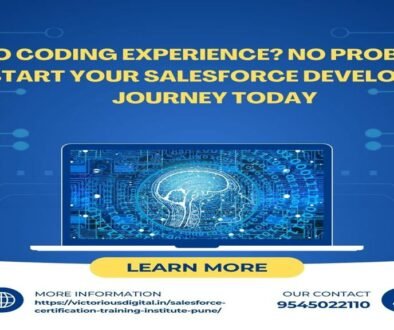Best Practices for Implementing Salesforce in Your Organization
In today’s fast-paced business environment, adopting Customer Relationship Management (CRM) tools like Salesforce is vital for maintaining a competitive edge. Whether you’re a small business or a large corporation, implementing Salesforce effectively can significantly enhance your customer interactions, improve sales processes, and streamline business operations. This article will delve into the best practices for implementing Salesforce in your organization and how to leverage resources like Salesforce classes in Pune and online Salesforce classes to maximize your investment.
Understanding Salesforce and Its Benefits
Salesforce is a leading CRM platform that offers a wide range of solutions for sales, customer service, marketing, and more. Its cloud-based nature allows for easy access and collaboration, making it an ideal choice for organizations looking to enhance their customer relationship management.
Key Benefits of Salesforce
- Improved Customer Insights: Salesforce provides a 360-degree view of customers, enabling personalized interactions and data-driven decisions.
- Increased Sales Productivity: With tools like Sales Cloud, businesses can automate tasks, manage contacts and opportunities, and track performance.
- Enhanced Collaboration: Salesforce facilitates real-time communication and collaboration among team members and across departments.
- Scalability and Customization: The platform can be customized to meet the specific needs of your business, and it scales as your business grows.
Defining Clear Objectives for Salesforce Implementation
Before diving into the implementation process, it’s crucial to define clear objectives that align with your business goals. Understanding what you hope to achieve with Salesforce will guide the configuration and customization of the platform.
Steps to Define Objectives
- Identify Pain Points: Assess the challenges your organization is currently facing in terms of sales, customer service, and marketing.
- Set Measurable Goals: Establish specific, measurable, achievable, relevant, and time-bound (SMART) goals for your Salesforce implementation.
- Align with Business Strategy: Ensure that your objectives align with your overall business strategy and customer engagement plans.
Assembling the Right Implementation Team
A successful Salesforce implementation requires the right team of individuals who understand the platform and can manage the transition effectively. This team should include key stakeholders from different departments, including IT, sales, and customer service.
Key Roles in an Implementation Team
- Project Manager: Oversees the implementation process and ensures that all tasks are completed on time.
- Salesforce Administrator: Manages the day-to-day operations of Salesforce and configures the platform to meet the organization’s needs.
- Salesforce Developer: Customizes and extends Salesforce functionality through code and integrations.
- Change Management Lead: Facilitates communication and training to ensure a smooth transition for users.
Choosing the Right Salesforce Edition and Features
Salesforce offers various editions, each with different features and pricing models. Selecting the right edition for your organization is crucial to ensure you have access to the necessary tools and capabilities.
Considerations When Choosing a Salesforce Edition
- Business Needs: Evaluate your organization’s requirements in terms of sales, customer service, and marketing.
- Budget Constraints: Consider the cost of each edition and choose one that fits within your budget.
- Scalability: Ensure that the edition you choose can scale as your business grows.
Integrating Salesforce with Existing Systems
Integrating Salesforce with your existing systems can enhance its functionality and provide a seamless experience for users. This integration can include connecting Salesforce with ERP systems, marketing automation tools, and other CRM platforms.
Benefits of Integration
- Improved Data Accuracy: Integration ensures that data is consistent across all systems, reducing the risk of errors and duplication.
- Enhanced Productivity: Users can access all necessary information in one place, streamlining processes and improving efficiency.
- Better Customer Insights: Integration provides a complete view of customer interactions across different channels.
Data Migration and Management
Data migration is a critical step in the Salesforce implementation process. It involves transferring data from your existing systems to Salesforce, ensuring that it is accurate, complete, and usable.
Best Practices for Data Migration
- Data Cleansing: Remove duplicate, outdated, or irrelevant data before migration.
- Data Mapping: Map your existing data fields to the corresponding fields in Salesforce.
- Testing: Test the data migration process to identify and resolve any issues before going live.
Setting Up Effective User Training Programs
Training is essential to ensure that your team can effectively use Salesforce and leverage its full capabilities. Providing comprehensive training programs will help users understand the platform and perform their tasks efficiently.
Types of Training Programs
- In-Person Training: Conduct hands-on training sessions to provide users with practical experience.
- Online Training: Utilize online resources, webinars, and tutorials for remote or ongoing training needs.
- Salesforce Classes in Pune and Online: Consider enrolling your team in professional Salesforce classes in Pune or online Salesforce classes to enhance their skills and knowledge.
Salesforce Classes in Pune and Online Options
For organizations based in Pune or looking for flexible training options, there are several Salesforce training providers available. These classes offer a structured learning environment with experienced instructors who can guide your team through the intricacies of Salesforce.
Benefits of Enrolling in Salesforce Classes
- Hands-On Experience: Classes provide practical exercises and real-world scenarios to help users apply their knowledge.
- Certified Instructors: Learn from certified Salesforce professionals with extensive experience in the platform.
- Flexible Scheduling: Online classes offer the flexibility to learn at your own pace and schedule.
Testing and Quality Assurance
Testing is a critical step in the Salesforce implementation process to ensure that the platform functions as expected and meets the organization’s requirements. This includes testing all features, integrations, and customizations.
Types of Testing
- Unit Testing: Test individual components and features of Salesforce to ensure they function correctly.
- Integration Testing: Verify that Salesforce integrates seamlessly with other systems and applications.
- User Acceptance Testing (UAT): Involve end-users in testing to ensure that the platform meets their needs and expectations.
Developing a Change Management Plan
Implementing a new CRM system like Salesforce involves significant changes in how your organization operates. A well-defined change management plan is crucial to ensure a smooth transition and minimize disruption.
Key Elements of a Change Management Plan
- Communication Strategy: Develop a clear communication plan to inform stakeholders about the implementation process and its impact.
- Training and Support: Provide ongoing training and support to help users adapt to the new system.
- Feedback Mechanisms: Establish channels for users to provide feedback and address any concerns or issues.
Monitoring and Continuous Improvement
Once Salesforce is implemented, it’s important to monitor its performance and continuously improve the platform to meet changing business needs. This involves tracking key performance indicators (KPIs), gathering user feedback, and making necessary adjustments.
Strategies for Continuous Improvement
- Regular Reviews: Conduct regular reviews of Salesforce usage and performance to identify areas for improvement.
- User Feedback: Encourage users to provide feedback on their experience with Salesforce and suggest enhancements.
- Stay Updated: Keep up-to-date with the latest Salesforce features and best practices to ensure your organization is leveraging the platform effectively.
Leveraging Salesforce Apps and Integrations
Salesforce offers a wide range of apps and integrations through its AppExchange marketplace. These apps can extend the functionality of Salesforce and provide additional capabilities for your organization.
Popular Salesforce Apps and Integrations
- Salesforce CPQ: Configure, price, and quote complex products with ease.
- Pardot: Automate and optimize your marketing campaigns.
- Service Cloud: Enhance your customer service operations with advanced features.
Ensuring Compliance and Security
Security and compliance are critical considerations when implementing Salesforce in your organization. Salesforce provides robust security features and compliance tools to help you protect your data and adhere to regulatory requirements.
Best Practices for Ensuring Compliance and Security
- Access Controls: Implement role-based access controls to restrict access to sensitive data.
- Data Encryption: Use encryption to protect data in transit and at rest.
- Audit Logs: Monitor and audit user activities to detect and prevent unauthorized access or data breaches.
Conclusion
Implementing Salesforce in your organization can be a game-changer, enhancing your customer relationships, improving sales productivity, and driving business growth. By following the best practices outlined in this article, you can ensure a successful implementation and maximize the return on your investment in Salesforce. Whether you’re considering Salesforce classes in Pune or online Salesforce classes to train your team, the right training and support are essential to unlocking the full potential of the platform.
FAQs
- What are the benefits of implementing Salesforce in my organization?
- Implementing Salesforce can improve customer insights, increase sales productivity, enhance collaboration, and provide scalability and customization options.
- How do I choose the right Salesforce edition for my business?
- Evaluate your business needs, budget constraints, and scalability requirements to choose the right Salesforce edition that aligns with your goals.
- What is the best way to train my team on Salesforce?
- Consider a combination of in-person training, online resources, and professional Salesforce classes, such as those available in Pune or online.
- How can I ensure the security of my data in Salesforce?
- Implement best practices for access controls, data encryption, and audit logs to protect your data and ensure compliance with regulatory requirements.
- What are some popular Salesforce apps and integrations?
- Popular Salesforce apps and integrations include Salesforce CPQ, Pardot, and Service Cloud, which can enhance your CRM capabilities and business processes.




